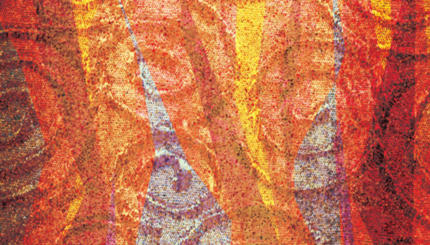Commentary on Parashat Mishpatim, Exodus 21:1-24:18
All too often, we think about connection with the sacred — with the holy, with God — as being about warm, fuzzy feelings. Those profound moments in prayer and meditation when something feels like it’s opening up, even just a little. And yet. Parashat Mishpatim makes it clear that even the most powerful theophany isn’t, in the scheme of things, all that important.
The work of covenant, this portion shows us, is sometimes daily and plodding — involving a lot less feeling and a lot more action. It’s not a coincidence that Mishpatim also includes the commandments neither to mistreat the stranger nor oppress the widow or the orphan. It also demands that we not charge interest in moneylending, not follow the masses in doing evil, not spread false rumors, not subvert the rights of the needy and that we rest on Shabbat.
In Mishpatim, God invites Moses to “ascend to God” (Exodus 24:1) with his brother Aaron, Aaron’s sons Nadav and Abihu, and the 70 elders of Israel. They do so and, the Torah tells us, they “saw the God of Israel; under God’s feet there was the very likeness of sapphire brickwork, like the very sky for purity… they beheld God, and they ate and drank” (Exodus 24:10-11). It’s an amazing thing, really — they saw God! They had a snack with God! They beheld the divine in a heavenly vision of brilliant sapphire blue! This is the peak religious experience, is it not?
And yet. After the communal vision of God, Moses continued up the mountain. He stayed there for 40 days and 40 nights, and he neither ate nor drank, because the experience wasn’t about his own pleasure. Moses’ entourage had come with him, but only partway up the mountain. Moses himself ascended higher. He went up into a place not about visions, but about commandments, into a place not about experiences, but about covenant. It is here that he accepts his and Israel’s half of the responsibility for a relationship with the divine. It’s not about getting something cool — but, rather, about agreeing to give something. It’s about getting a lot of rules to follow. All the “do this, don’t do that” of the Torah, while perhaps more inconvenient to the seeker of ecstasy, is, in this case, on a higher level.
With your help, My Jewish Learning can provide endless opportunities for learning, connection and discovery.
Religious practice is meant to transform who we are and how we live in relation to the world. The Code of Jewish Law, or the Shulchan Aruch (Yoreh Deah 249:14), recommends donating a little bit of money — even just a few coins — to charity every weekday morning before prayer. After doing so, it becomes harder to pray only for our own personal needs and warm fuzzy feelings and to forget about the suffering and injustice outside our door. Of course, awareness of the big picture is packed into the liturgy, but the act of giving imprints itself on our consciousness, and it becomes harder to slip back into the familiar litany of me, me, me.
Rabbi Akiva, one of the greatest ancient rabbinic sages, once said that the greatest principle of the whole entire Torah is “V’ahavta l’re’echa k’mocha”: You should love your neighbor as yourself. Holiness is in what we do in this world, in this plane. We serve God most — we are at the highest point on the mountain — not when we feel good, but when we stretch beyond ourselves and offer ourselves to those who need, quite badly, what we have to offer.
Torah
Pronunced: TORE-uh, Origin: Hebrew, the Five Books of Moses.



